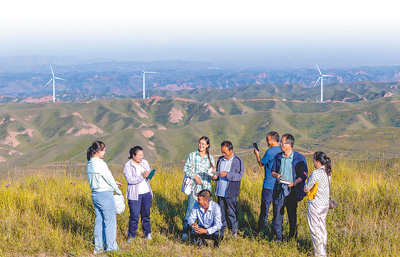




- BRNN
- BRI News
- BRNN News
- Database
Official Documents Polices and Regulations
Inter-government Documents International Cooperation BRI Countries
Business Guide Economic Data BRI Data
Trade
Investment Projects Latest projects
Cases - Content Pool
Xiji county, a mountainous county in Guyuan city, northwest China's Ningxia Hui Autonomous Region, has become an epicenter for literary creativity.
Once known for its arid landscape and harsh natural conditions, the county has transformed into a thriving hub of writers—many of them farmers—who have turned to literature to illuminate both their personal struggles and the significant changes in their hometown.

Photo No. 1 shows primary school students participating in a study tour at a museum of literature in Xiji county, Guyuan city, northwest China's Ningxia Hui Autonomous Region. (People's Daily/Yi Xiao)
Photo No. 2 shows farmer-writer Ma Jun as he poses for a picture with his Junma Award trophy, certificate, and his winning work, a prose collection titled "Qing Bai Shijie" (The Green and White Stone Steps), at his home in Xiji county, Guyuan city, northwest China's Ningxia Hui Autonomous Region. (Photo by Shi Long)
With a population of less than 500,000, Xiji county is home to over 1,600 writers, including more than 300 farmer-writers. Among them, 23 are members of the China Writers Association (CWA), and 124 are members of the Ningxia Writer's Association.
Writers from the county have won prestigious national literary awards nearly 40 times, including the Lu Xun Literature Prize and the Junma Award.
In 2011, Xiji was awarded the honorary title of "hometown of literature" by the Chinese Literature Foundation under the CWA, a testament to the county's remarkable literary blossoming.
From hardship to hope: The rise of farmer-writers
For many writers in Xiji county, literature is more than just an art form—it's a lifeline.
Shan Xiaohua, a farmer from Gaotong village, Jiqiang township, Xiji county, discovered a profound solace in writing while battling both family tragedies and personal illness.
By day, she works in the fields and takes on labor jobs; by night, she writes. Her first book, a collection of prose, was published in 2019.
In October 2023, Shan officially became a member of the CWA by virtue of her literary works exceeding more than 1 million characters in total.
For Shan, writing has been a form of healing, a source of income, and an avenue to share the lives and struggles of rural China.
Crops, poultry and livestock, as well as the daily routine of life, have all become sources of inspiration for Shan's works.
"As a farmer-writer, I feel responsible for sharing the stories of rural areas and making the voices of farmers heard," she noted, explaining that although she doesn't know sophisticated writing techniques, she hopes to write as a camera does—faithfully and realistically, capturing the authentic rural life.
Another farmer-writer, Kang Pengfei, found his calling in literature after reading the famous novel "Ordinary World" by Chinese writer Lu Yao.
Born into poverty, Kang dropped out of junior middle school and started working at the age of 15. Deeply inspired by the perseverance and stories of struggle of the characters in the novel, Kang resolved to share his own stories by embarking on the road of literary creation.
Juggling farm work and part-time jobs with his passion for writing, Kang cultivated his mind through writing, harvesting rich fruits.
His novel titled "Ye Ban Che", which translates as "Night Bus", received an honorable mention at the inaugural Kunpeng literature awards for migrant workers, a notable achievement in his literary career.
In 2016, Kang was elected vice chairman of the Federation of Literary and Art Circles of Guyuan city.
The stories of Shan and Kang reflect the experiences of many in Xiji, where farmers diligently work in the field of literature in their spare time, turning their thoughts and observations from the fields into words written under evening lamps.
Witnesses and recorders of great changes during rural revitalization
Located in Xihaigu, once one of the most uninhabitable places for humans, Xiji has long been plagued by fragile ecosystems, water shortages, and frequent meteorological disasters.
"When material resources are extremely scarce, people need spiritual strength even more," said a local writer named Fan Wenju, pointing out an intrinsic connection between the scarcity of material resources and the flourishing of local literature.
"The landscape may be filled with barren mountains, but literary imagination transcends this, creating a world of its own, soaring toward the boundless horizon," said Fan, who is also the chief editor of a Xiji-based literary magazine named Hulu River.

Farmer-writers in Xiji county, Guyuan city, northwest China's Ningxia Hui Autonomous Region, go out for field research. (File photo by People's Daily reporter Yi Xiao).
The literary output from Xiji often focuses on the locality's transformation, especially the significant changes brought about by China's poverty alleviation efforts and rural vitalization campaign over the past decades.
In 1982, China's State Council launched a poverty alleviation initiative to assist with agricultural development in Hexi Corridor and Dingxi city in northwest China's Gansu Province, as well as Xihaigu in Ningxia, pioneering the country's planned, organized, and large-scale poverty reduction efforts.
Over the past 40-plus years, a slew of poverty alleviation moves taken by the country, from the "pairing assistance" program to the targeted poverty alleviation strategy, have freed the people of Xihaigu from poverty.
In November 2020, Xiji county was removed from the country's list of impoverished counties, marking the complete eradication of poverty in Xihaigu, once known as one of China's poorest areas.
Local writers including Ma Jinlian have chronicled the tremendous transformation of Xihaigu in their literary creations.
Born in a natural village called Shanziwan in Shizi township, Xiji county, Ma has benefited from China's targeted poverty alleviation strategy.
After learning that Shanziwan village, where 40 households once struggled to make a living, was about to be relocated to a new site with a better environment, Ma's first reaction was to record this historic event.
"I wanted to record this village, this relocation, and the people who live here. And I wanted to record this forward-moving era," Ma said.
She wrote a novel based on interviews with local residents and her own experiences, offering profound insights into significant changes in her village and the Xihaigu area.
The novel is titled "Qin Ai De Ren Men", which can be translated as "Dear People". It was published several months ago.
Spanning from the late 1980s to the present, the book includes many meaningful events, such as the village getting access to electricity, the villagers working together to build bridges and roads, and the young people in the village beginning to sell products via livestreaming.
It presents a vivid tapestry of tremendous changes in the rural area of western China with over 800,000 characters.
"The backdrop of this era is filled with hope, and the essence of my book is also bright," Ma said.
More and more farmers like Ma, as firsthand witnesses to China's unprecedented fight against poverty, are being transformed. They are not only more actively involved in building their hometown but also more confidently expressing their thoughts, feelings, and observations.
Many local farmers who once gave up writing due to economic pressures have returned to their creative roots and published a great number of works depicting changes in their lives.
As poverty alleviation-themed novels, prose, and poems started to emerge one after another, the literary landscape of Xiji started to shift away from depictions of suffering to ones of hope, renewal, and the anticipation of a brighter future.
Local writers are using fresh narrative themes and aesthetic forms to depict the tremendous changes in the mountainous areas and the spiritual transformation of the people in the new era, pointed out Xu Feng, associate research fellow with the cultural research institute of the Ningxia Academy of Social Sciences.
"Suffering is gradually fading, and the people's yearning for a better life is increasingly being told," Xu noted.
A cradle of literature
The strong literary atmosphere in Xiji is largely attributed to the magazine Hulu River as well as the local government's support.
In 1987, a group of literature enthusiasts in Xiji county established Ningxia's first literary society — the Hulu River literary society, which is named after Xiji's mother river, Hulu River.
Members of the literary society printed and bound their poems and prose into a 48-page booklet titled "Hulu River" at their own expense, and distributed it for free.
Over time, the booklet gradually evolved into Xiji's first literary quarterly and became the main literary platform in the county, attracting a growing number of literature enthusiasts.
The membership of the literary society has expanded from seven to more than 60, including writer Guo Wenbin, whose work was nominated for the 8th Mao Dun Literature Prize, one of the most prestigious literature prizes in China.
In 2007, with full support from the government of Xiji county, the Xiji federation of literary and art circles relaunched Hulu River magazine, which suspended publication in 1991 due to financial and staffing challenges.
"Although Xiji county's finances are not very abundant, the annual budget of 120,000 yuan ($16,482.61) has always been consistent, allowing us to publish the magazine with peace of mind," said Fan Wenju.
"Look, the secretary of the Communist Party of China Xiji county committee was present at all these cultural events," Fan said, pointing to photos on a wall of the editorial office of Hulu River magazine.
"Many writers who have emerged from Xiji have been influenced by Hulu River magazine," Fan said, noting that the magazine has always strived to embrace and encourage creators, and has served as a cradle for Xiji's writers.
The county government values Xiji residents' enthusiasm for literary creation, and has made vigorous efforts to facilitate the development of its literature industry.
In 2009, Xiji county adopted a plan to establish itself as the "hometown of literature", forming a leadership team headed by the county Party secretary and mayor, and setting up grassroots literary and artistic associations in every township and county department.
Since then, Xiji has invested over 20 million yuan to build more than 10 bases for literary and artistic creations.
In August 2024, Ningxia's first literary practice site for writers to gain deep insights into life and better connect their works to the experiences of the general public was established in Xiji.
Attaching great importance to recognizing and nurturing young talents, Xiji has carefully cultivated its literary "seedlings". It has given awards to outstanding students for their literary achievements, and promoted the development of literary clubs and school publications in various schools.
Currently, there are more than 20 school literary clubs and over 20 school publications across the county.
Leveraging its unique literary resources, Xiji has recently explored the integrated development of literature and agriculture, culture, and tourism.
The county has developed several literature-themed educational venues and continued to host various culture and tourism-themed festivals and celebrations, shining a spotlight on its reputation as the "hometown of literature".
In 2024, Xiji county received nearly 4.48 million visits.

Tel:86-10-65363107, 86-10-65368220, 86-10-65363106